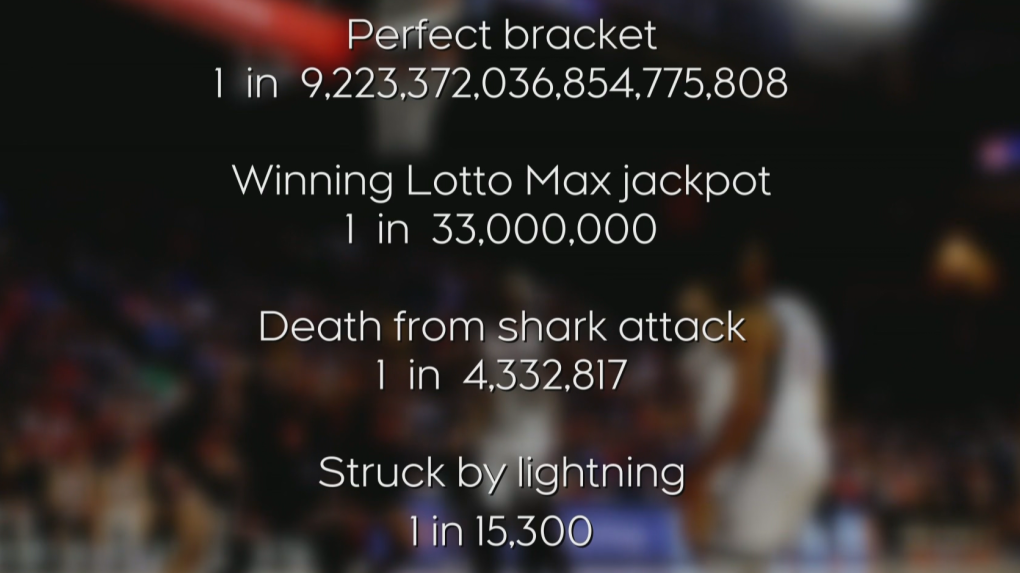March Madness: Fewer grains of sand on earth than odds of picking the perfect bracket, says Waterloo statistician
Just one day into this year’s March Madness tournament, a handful of upsets are breaking hearts and busting brackets.
Thursday saw several top-seeded teams knocked out, as Kentucky, South Carolina and BYU were each handed first-round exits.
“It definitely just eliminated a lot of people’s brackets,” said Isaac White, a fan in Waterloo.
Sports network ESPN collected 22.6 million brackets by tip-off Thursday. Coming into Friday, the National Collegiate Athletic Association (NCAA) reported only .00038 per cent of brackets submitted to it remain perfect.
“It’s outstanding to me,” White said. “I find it very unreal that it’s so hard to pick a perfect bracket.”
Why is March Madness so hard to predict?
The NCAA claims there is a 1 in 9.2 quintillion chance of predicting a flawless bracket just by randomly guessing on each game.
“It’s been estimated there around are about… 7.5 quintillion grains of sand on the planet. So 1 in 9.2? That’s more than there are grains of sand,” says Michael Wallace, an associate professor of biostatistics at the University of Waterloo.
Wallace says rough estimates suggest you would be more likely to win Ontario’s Lotto Max jackpot, die from a shark attack and be struck by lightning simultaneously than perfectly predict all 63 games of the NCAA tournament.
"About one in four games are upsets and if one in four games are upsets and you're trying to predict a 63-game tournament, even the best math in the world isn't going to get you there," Wallace explains.

Has anyone had a perfect March Madness bracket?
No, but just a few years ago, a neuropsychologist from Columbus, Ohio got close. In 2019, Gregg Nigl posted in the longest verified streak in history. Nigl correctly predicted the first 49 games of that year’s tournament, until Purdue’s overtime win over Tennessee busted his bracket in game 50.
No one has ever predicted a perfect bracket that’s been verified by the NCAA, and it’s a trend that’s not likely to change in our lifetime.
Although even with near impossible odds, most fans would agree, you can never say never.
Correction
This story previously ran with the headline “March Madness: More grains of sand on earth than odds of picking the perfect bracket, says Waterloo statistician.” There are, in fact, more possible brackets than estimated grains of sand on earth. The headline has been corrected.
CTVNews.ca Top Stories

LIVE UPDATES Latest info: FBI says the New Orleans truck attacker acted alone in an 'act of terrorism'
The FBI now says the New Orleans truck attacker acted alone in an 'act of terrorism' when he drove a pickup truck into a crowd of New Year's revellers early Wednesday, killing 15 people.
FORECAST Weather warnings issued in 6 provinces and territories
Wintry weather conditions, including heavy snow and wind chill values around -55, prompted warnings in six provinces and territories early Thursday morning.
Man who died in Tesla Cybertruck explosion was active-duty U.S. army soldier, officials say
The person who authorities believe died in the explosion of a Tesla Cybertruck packed with firework mortars and camp fuel canisters outside U.S. president-elect Donald Trump's Las Vegas hotel was an active-duty U.S. Army soldier, three U.S. officials told The Associated Press on Thursday.
BREAKING Woman, father killed on New Year's Eve were victims of intimate partner violence: Halifax police
Halifax police are investigating three deaths that are connected – two of which they say were homicides resulting from intimate partner violence – in the city on New Year’s Eve.
5 things we know and still don't know about COVID, 5 years after it appeared
The virus is still with us, though humanity has built up immunity through vaccinations and infections. It's less deadly than it was in the pandemic's early days and it no longer tops the list of leading causes of death. But the virus is evolving, meaning scientists must track it closely.
Who are Canada's top-earning CEOs and how much do they make?
Canada's 100 highest-paid CEOs earned $13.2 million on average in 2023 from salaries, bonuses and other compensation, according to the Canadian Centre for Policy Alternatives.
More Popsicles, please: Your tonsils can grow back
Tonsil regrowth is rare. Here's one woman's experience when she had to get her tonsils removed – again.
How to watch the Quadrantids, one of the strongest meteor showers of the year
The new year kicks off with the peak of the Quadrantids, one of the strongest meteor showers of the year, according to NASA.
10 people are wounded in a shooting outside a New York City nightclub
Ten people were wounded in a shooting outside a New York City nightclub while they were waiting to get into a private event, police said.


































